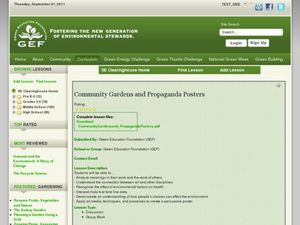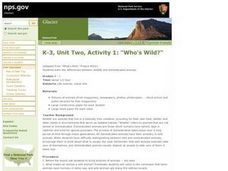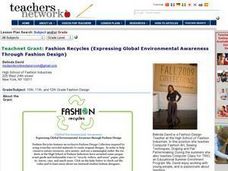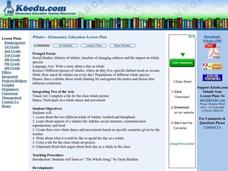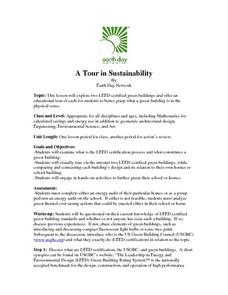Curated OER
Community Gardens and Propaganda Posters
Students research community gardens. In this community garden lesson plan, students discover the history of community gardens and assess the benefits of locally grown food. Students create propaganda posters aimed at inviting discussions...
Curated OER
Rainforest Introduction
First graders create parrots and butterflies by using art materials to introduce them to rainforest animals. In this art lesson plan, 1st graders then use these animals to create a class rainforest.
Curated OER
The Very Hungry Caterpillar
Here is a good lesson on butterflies and caterpillars. After listening to The Very Hungry Caterpillar, young learners put cards that depict the life cycle of a butterfly in the correct order. There are some good ideas for center...
Curated OER
Prairie Senses
Second graders use their senses to explore a prairie or imaginary prairie. They draw pictures to represent the five senses and discover how an artist describes non-visual sensations in a visual way.
Curated OER
Who's Wild?
Students explore the differences between animals of the wild and domesticated animals. In this wild animals instructional activity, students understand that tame animals ancestors were once wild. Students illustrate the differences by...
Curated OER
Fashion Recycles
Complete fashion design activities as a part of a study on protecting the environment. In this fashion and environment lesson, students discuss global environmental awareness and work in groups to list recyclable products that can be...
Curated OER
Keep It Clean…Or Pass It Around
Students identify the harmful and beneficial effects of bacteria. In this biology lesson plan, students test the effectiveness of antibacterial cleaners. They create a presentation based on researched information and experimental results.
Curated OER
Whales
Learners study the history of whales. In this whale lesson plan, students research two types of whales, color a tile, and write a one page paper. The tiles may be combined to make a group picture.
Curated OER
Technology that Makes Phonics Fun
Students discover the Internet by participating in on-line educational activities. In this educational technology instructional activity, students utilize interactive story books, podcasts, and games to help expand an understanding of...
Curated OER
Under the Sea - KWL Chart
Students create a KWL chart to start the discussion on ocean animals. They practice sorting the animals into their different classifications. They use indexes, table of contents and glossary to find information.
Curated OER
Salt Marsh in a Pan
Students create a model of a salt marsh to discover the impact of pollution and human activities on water-based habitats including bays and the ocean. They recognize the relationship between natural and developed areas. Students impact...
Curated OER
What's the Depth?
Students practice digital camera skills by identifying effects of depth of field at different apertures, comparing effects of depth of field with different focal lengths, and creating images showing effect of depth of field at different...
Curated OER
A Tour in Sustainability
Students explore two LEED certified green buildings. They examine what is the LEED certification process and what constitutes a green building. They tour via the internet two LEED certified green buildings, while comparing and...
National First Ladies' Library
Science: The Purloined Letter
Students examine Edgar Allan Poe's "the Purloined Letter" from the perspective of a profiler. To sharpen search procedures, they examine the text and make lists of items and places in the house that were searched. Then students discuss...


